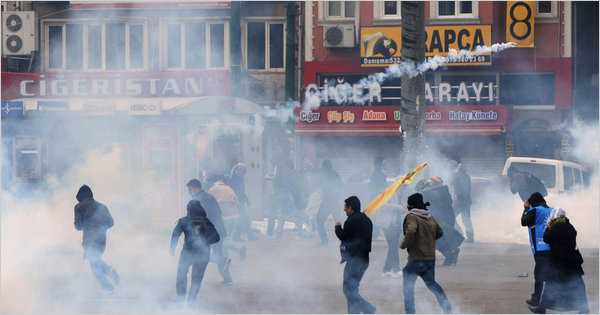A BALEFUL love song wafted from the Vizyon Muzik Market. Not so long ago playing Kurdish music over a loudspeaker into the streets here might have provoked the Turkish police. Just speaking the names of certain Kurdish singers at one time could have landed a Kurd in prison.

These days hundreds of CDs featuring Kurdish pop singers fill one of the long walls in the small, shoebox-shaped Vizyon Muzik. The discs face a few dozen Turkish ones. Abdulvahap Ciftci, the 25-year-old Kurd who runs the place, told me one sunny morning not long ago that customers buy some 250 Kurdish albums a week. “And maybe I sell one Turkish album,” he calculated, wagging a single finger, slowly. “Maybe.”
Turkey is holding elections in a few days. For months pro-Kurdish activists have been staging rallies that during recent weeks have increasingly turned into violent confrontations with the police in this heavily Kurdish region of the southeast. Capitalizing on the Arab Spring and the general state of turmoil in that part of the world, as well as on Turkey’s vocal support for Egyptian reformers, the Kurds here have been looking toward elections to press longstanding claims for broader parliamentary representation and more freedoms, political and cultural.
Not that there’s ever much difference between politics and culture for this country’s Kurds. Since the 1920s, when Turkey started forcibly assimilating its Kurds, roughly 20 percent of the population, in a struggle to forge a nation-state out of the broken remnants of the Ottoman Empire, they have resisted. Since the mid-1980s tens of thousands on both sides have died. This must now be the world’s longest bloody conflict.
In March a Turkish movie, “Press,” opened in Istanbul, recounting the torture and killing of dozens of investigative journalists working for Ozgur Gundem, a newspaper here at the epicenter of the Kurdish struggle. More than 75 of its employees were killed from 1992 to 1994, when the paper was shut down by the government. Only just recently it went back into print. Still, the movie’s 38-year-old director, Sedat Yilmaz, told me recently, the police wanted to make sure he used fake copies of Ozgur Gundem, not real ones.
“It is now at least possible to talk about issues a little more openly,” Mr. Yilmaz said. We spoke over a din at the film’s opening in a basement theater in Istanbul, amid a crush of young Turks engulfed, as usual, in a thick nimbus of blue cigarette smoke. “The best way to do this is through films and plays and music, which is finally starting to happen.” At the Istanbul International film festival in April “Press” won the Turkish equivalent of an Oscar for its exploration of human rights abuses.
But change comes slowly, incrementally, if at all here. Concessions by the government of Prime Minister Recep Tayyip Erdogan in 2009 made way for the first Kurdish national television station, and the government also permitted the teaching of Kurdish language classes in private universities (but not public ones). Token gestures, they made front-page headlines: first because they were signals to the outside world that a democratic state run by an Islamic leader will not automatically become xenophobic or tribalist, and second because even small steps toward acknowledging Kurdish culture can provoke political firestorms inside the country. Turkish nationalists raised a ruckus. Nationalists regard even the most basic Kurdish demand — that their language also be allowed in grade schools and at official settings where Kurds are involved — as treason.
Turkish Kurds respond that increased cultural freedom only encourages their loyalty to the Turkish state. But in this deeply patriotic country, where sentiments are old and entrenched, Mr. Erdogan’s government, guarding its tenuous majority in Parliament on the verge of the elections, has assumed a more and more hawkish line lately. The arrests of large numbers of Kurdish political activists have fed the Kurds’ concern that the government never really had true democracy in mind for them but just cooked up some window dressing for Western consumption. Recent clashes in this city between the police and hundreds of protesters attending the funerals of separatist militants proved how fragile the peace is in the region.
via Turkey’s Kurds Slowly Build Cultural Autonomy – NYTimes.com.

